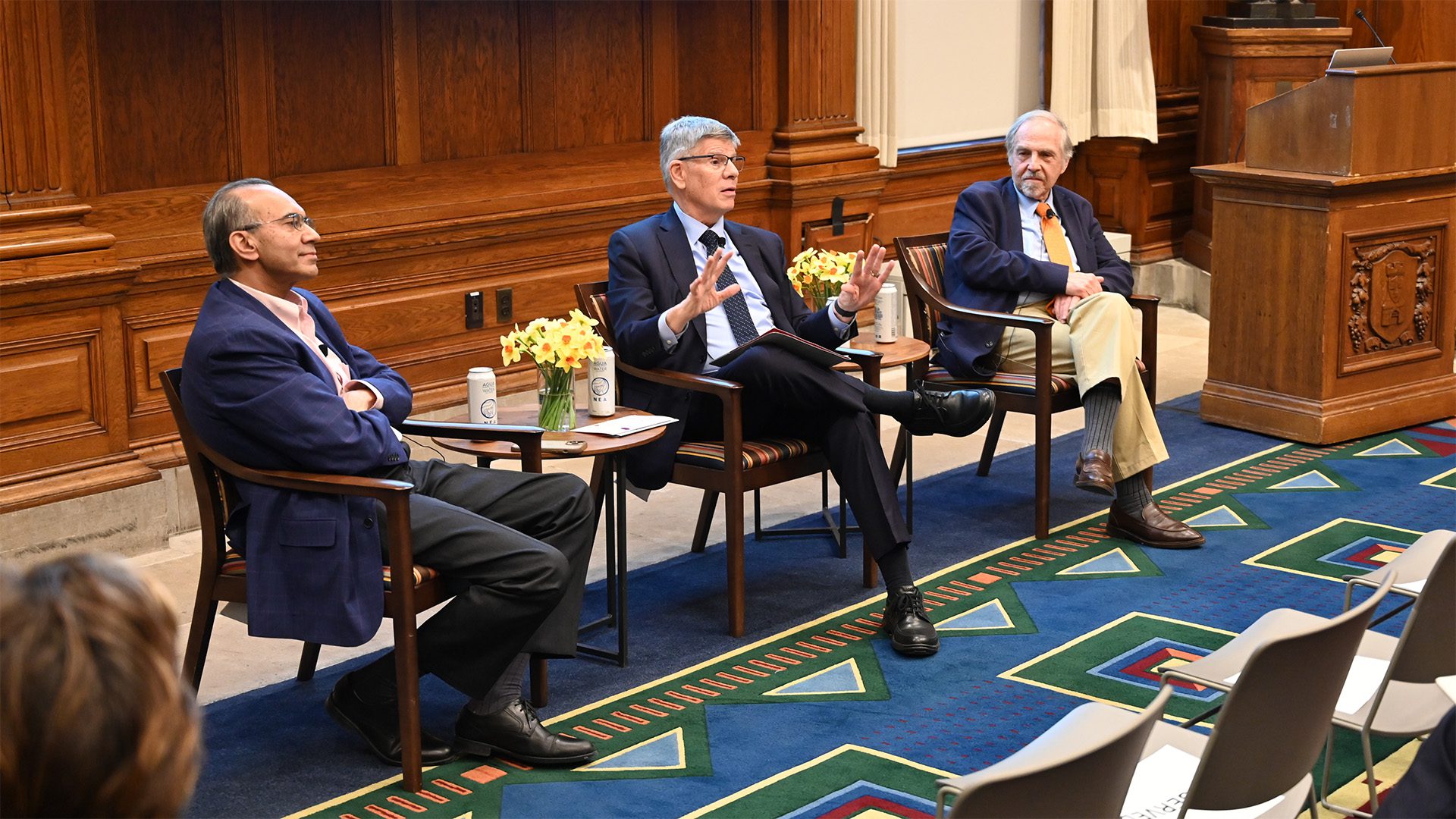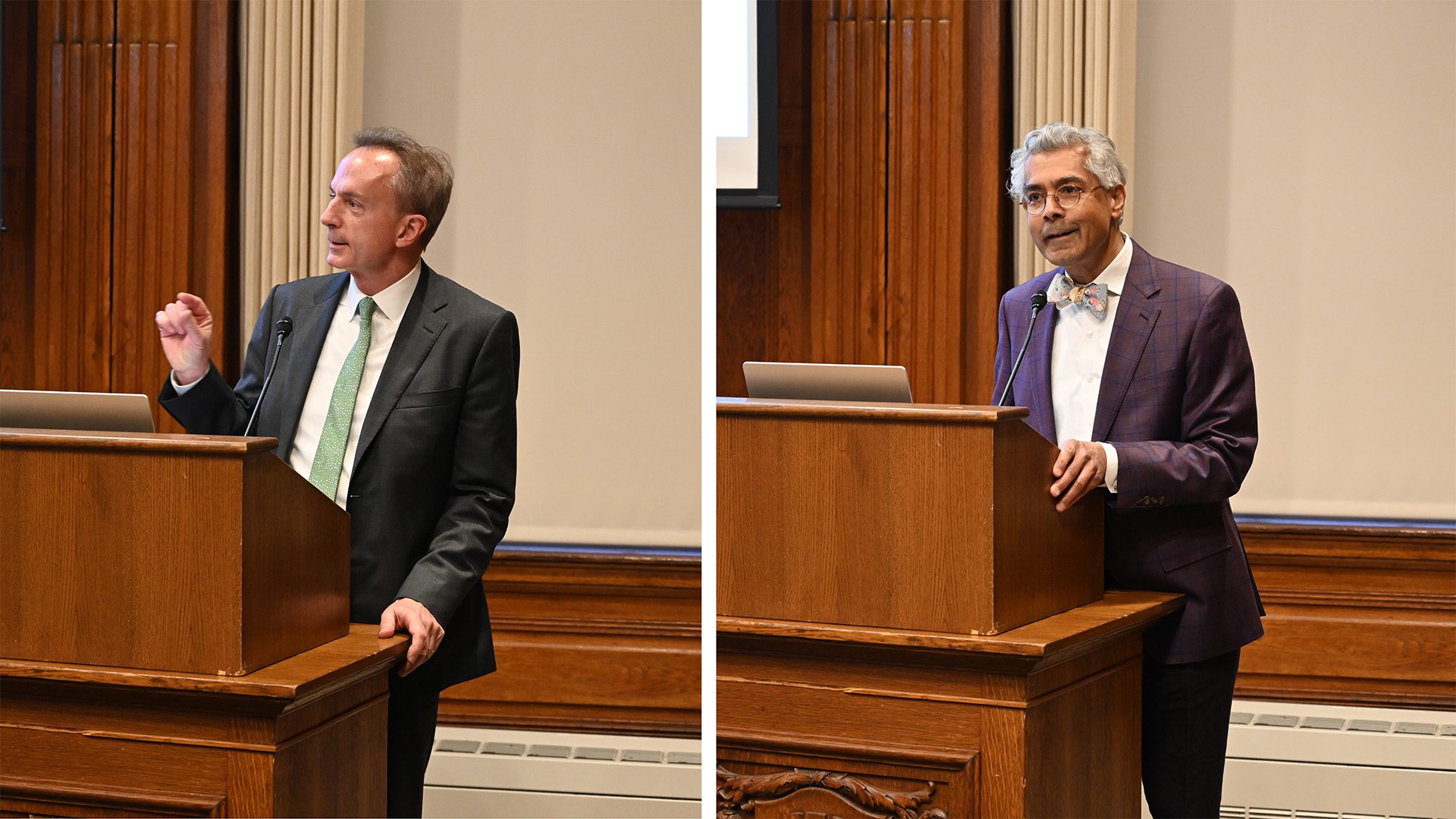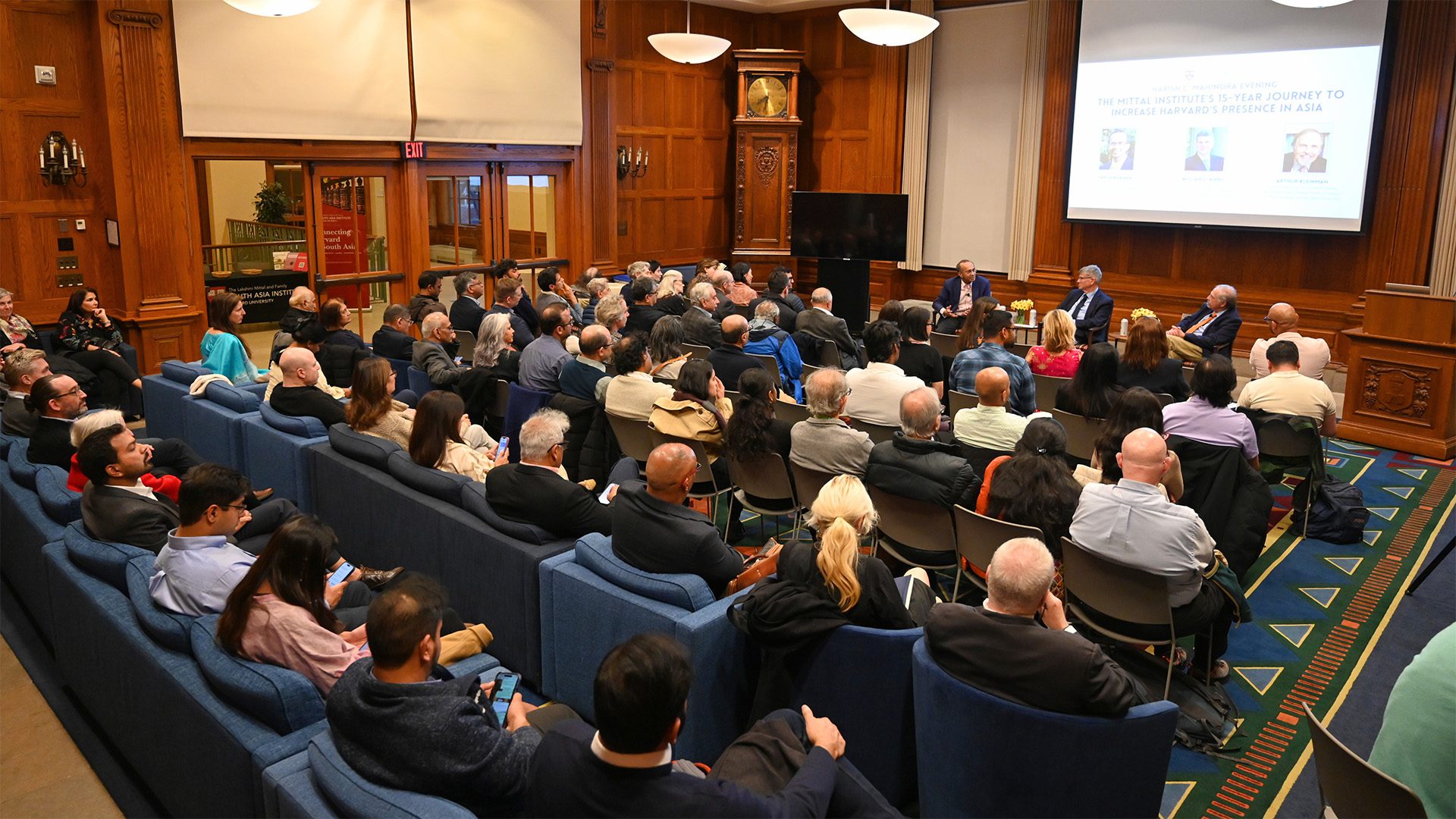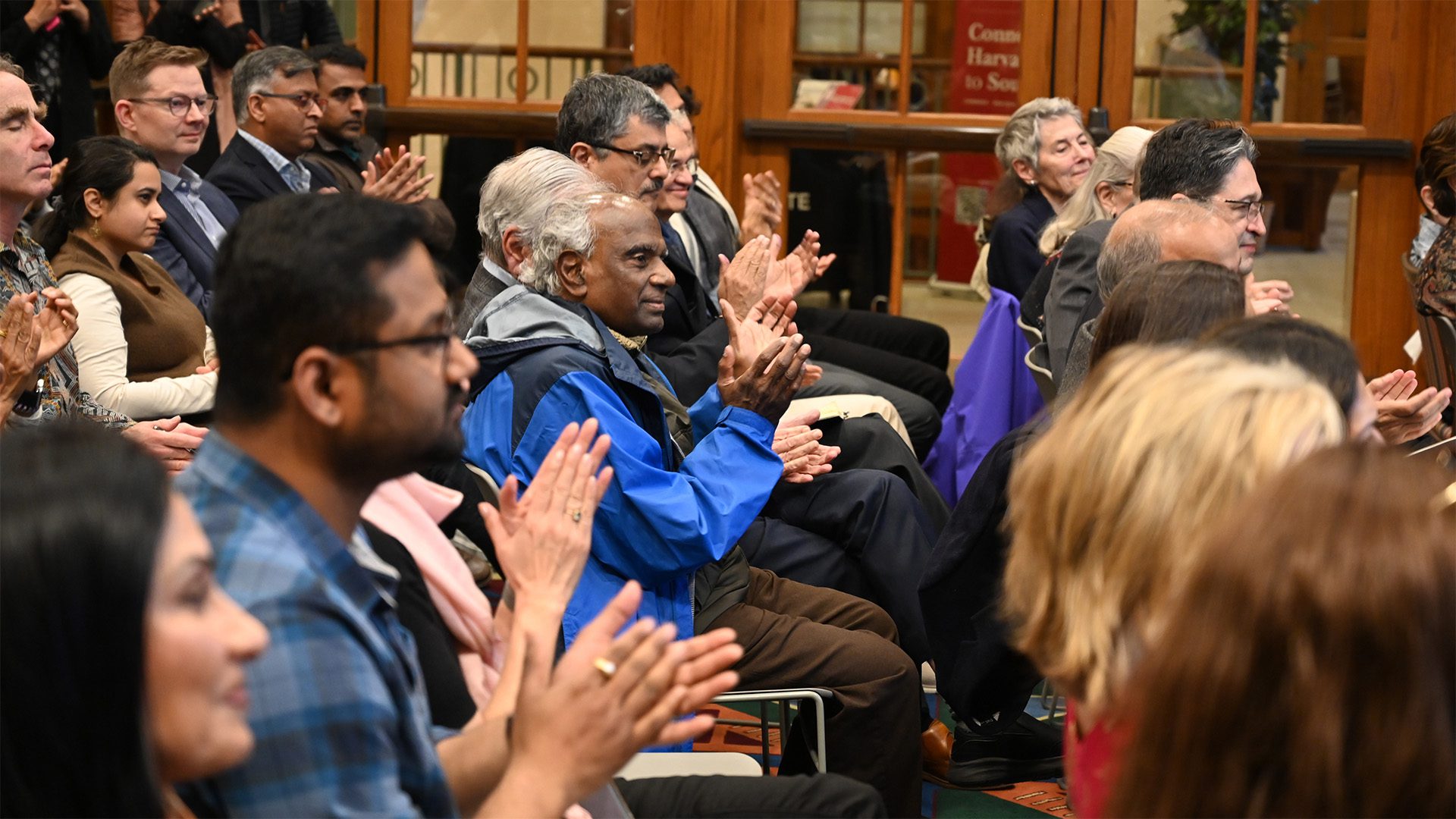To kick off this year’s Annual Symposium focused on media, climate, and arts, the Mittal Institute hosted a special Harish C. Mahindra Evening on Thursday, April 17. The evening featured Tarun Khanna, Mittal Institute Faculty Director; William C. Kirby, former Fairbank Center Director; and Arthur Kleinman, former Asia Center director. In conversation with each other, they discussed the Mittal Institute’s 15-year journey to increase Harvard’s presence in Asia, the extraordinary leadership of Tarun Khanna, and the differences between the Mittal Institute and other international centers at Harvard.
Below is an edited version of the discussion. For the full discussion, please watch the recording above.
Hitesh Hathi: It’s a deep honor for me to be here to welcome all of you on behalf of the Mittal Institute for a unique occasion. We have people here from all over the world: Lahore, New Delhi, Mumbai, from San Francisco, Miami, New York, from every part of the University. So it’s a great pleasure to welcome all of you. And I want to say at the outset, I’m particularly grateful to all of you for showing up today. It’s a uniquely challenging time in history, and certainly, a challenging time for Harvard University. We hope that what this evening offers is something of the joys of collegiality in the pursuit of the important work that we do here at Harvard. And turning to that important work, let me just say one brief word about the Mittal Institute. Our mission is to connect the University to South Asia. So we are an international institute, a multidisciplinary institute for research and scholarship connected to South Asia, and for everything that proceeds out of those.
Tarun Khanna: When I was asked by Drew Faust, who was then Harvard’s president, and Steve Hyman, who was then provost, to create the Institute, my initial reaction was ‘no’, because I’m not an area studies person – I am an applied math economist taking full advantage of tenure to explore widely in different fields. But Harvard Business School’s dean at the time, Nitin Nohria, encouraged me, as did John Briscoe, who, some of you may remember, had a lot of experience in Brazil and Pakistan, the World Bank. So I jumped into it.
The first thing I did as a good entrepreneur would do was to look around and see what other centers did. And I found two very strange things to my untutored eye. One was that every faculty director seemed to interpret his/her role in his/her own image. If you were an anthropologist, you basically invited anthropologists. If you were an economist, you would invite economists, because those are the people you hang out with and know. I found that really odd, because we’re in a University that’s bursting with talent. So the first principle we had was to run a completely open platform, where the director would not be involved in choosing the projects; instead, there would be a steering committee at arm’s length that would rotate, and the steering committee would decide resource allocation. It just seemed like a good governance principle, and one that was designed to survive whoever had the responsibility of steering the center.
The other thing I noticed, which rankled me a bit, was that all the centers were ensconced in their ivory towers in New Haven, or Providence, or Princeton, or wherever else. And I just thought, that’s really strange, and that it’s going to be really hard. Having grown up in India and spent 15 years wandering around rural China, learning to speak a little bit of Chinese… I knew that we would not be welcome in any of these countries unless we were seen as complete citizens of these places.
Harvard is very careful about where they open centers, but I knew we had to have centers in different places. The geopolitics of the region, including the tension between India and Pakistan, and just the realities on the ground, prevented us from having centers in all the countries, but at least we managed to build one big one [in New Delhi], and then have a presence in other places.
“The geopolitics of the region, including the tension between India and Pakistan, and just the realities on the ground, prevented us from having centers in all the countries, but at least we managed to build one big one [in New Delhi], and then have a presence in other places.”

From left to right: Tarun Khanna, William C. Kirby, Arthur Kleinman
So those are the two guiding principles: an open platform, where anyone can approach us, with a steering committee at arms-length to guide what we do; and the second is feet on the street so that you’re credible, you’re relevant, and most importantly, you’re seen as a local citizen. Otherwise, the thing you always hear about universities that are perceived – probably rightly – as being somewhat elitist, is, “who are you to come and tell us what to do?” And, “why are you here?”
“Two guiding principles: an open platform, where anyone can approach us, with a steering committee at arms-length to guide what we do; and the second is feet on the street so that you’re credible, you’re relevant, and most importantly, you’re seen as a local citizen.”
I’m an inveterate optimist just by nature. To me, it’s always glass half full. And I keep telling Hitesh and our team that even though we work with about 200 faculty now in all the schools, we are barely touching 5% of the faculty. Most people at Harvard still don’t know what the Mittal Institute is. And I see that as a massive opportunity to keep on doing amazing things. So, it’s been a privilege.
William Kirby: I just want you to appreciate how difficult it is to establish something like the Mittal Institute, to establish something altogether new in a University that, in Chinese historical terms, dates from the late Ming dynasty, because that’s when we were founded. So this is not easy. And when one comes into an enterprise with a wish, as Tarun and his predecessors had, to build South Asian studies at a place that had not much South Asian studies, it was a very heavy lift. You have to understand, for example, that in East Asian studies, which is my area, and Arthur’s area to a considerable degree – we were the beneficiaries of the fact that China was an enemy to the United States. The National Defense budget put a lot of money into training people like us in our day. India was not a danger, so very little money was put into South Asian studies across the country. It was comparatively weaker than East Asian studies, but at Harvard, it was virtually non-existent.
When I chaired our council on East Asian studies, from which we founded our Asia Center, and then when I was director of the Asia Center, we made it very clear that the mission of the Asia Center was, in part, to build up South Asia and to incubate South Asian studies. And I think we’ve succeeded in time, but thanks to Tarun and his colleagues in South Asian studies, to a remarkable degree. When I was Dean of FAS, I supported financially and otherwise the establishment of what was an Initiative, and Professor Bose was the first professor of this, and set the foundation of what would happen afterwards. With the help of Mukesh Prasad, who’s right here in front of us, we began to raise money. Gradually, a foundation was set.
What Tarun has done is just remarkable. He has made this the most University-wide center of any of our University centers here, with extraordinary participation from the medical complex, public health, divinity, and education [schools]. There isn’t a school that has not been a central part of this. And that is very, very rare at an institution. It’s a remarkable accomplishment.
“What Tarun has done is just remarkable. He has made this the most University-wide center of any of our University centers here with extraordinary participation from the medical complex, public health, divinity, education [schools].”

Image, left: Mark Elliott, Vice Provost for International Affairs at Harvard University. Image, right: Hitesh Hathi, Executive Director of the Mittal Institute
Arthur Kleinman: I want to take us back to when Tarun started in 2010, and a little backdrop to that. I’m the only Harvard faculty member who’s chaired departments on both sides of the river. I chaired the Global Health and Social Medicine Department, which Vikram Patel has made such an extraordinary place, and before him, Paul Farmer. And I chaired the Anthropology Department. And in 2008, I was asked to take over the Asia Center.
When Tarun started, there were some real challenges that are worth remembering. First, we had several faculty who were relevant to South Asia who refused to participate. For whatever their reasons, they made it difficult because they happened to be faculty in FAS, and Tarun was coming from the Harvard Business School. If you looked across the center directors, almost all of us were FAS appointed. And not only were most of us FAS appointed, but almost all of us worked in East Asia, either China or Japan. So Tarun began with little help from within the FAS. But coming from the outside of FAS, Tarun had the great strength of representing the whole University. Tarun made his center centrally alive in that way. (…) He brings not just this sense of efficacy, but of openness to multiple ideas, and an idea that interdisciplinary collaboration should be at the heart of things. It’s been incredible for me to watch as he began, and then built, this extraordinary Institute. (…) So all I can say is that I find him one of the most extraordinary colleagues that I’ve had. This is my 49th year here at Harvard. I’ve seen the good parts of Harvard and the bad parts. And I think we should all recognize right now how marvelous it is to be on the right side of history with Harvard at this moment.
“Tarun brings not just this sense of efficacy, but of openness to multiple ideas, and an idea that interdisciplinary collaboration should be at the heart of things. It’s been incredible for me to watch as he began, and then built, this extraordinary Institute.”
William Kirby: Let me just add, I talked about how difficult it is to start something. How do you make something that endures? If you look at the different centers around the University, those that have endured and that are strong have great centers of gravity, and faculty, and students, and so on, and almost all of them are associated with a leading faculty entrepreneur – somebody who said, Harvard is not a place that is big on central planning. We have no central planning, to be frank. If you try and find a strategic plan for the University, I guarantee you it does not exist. It does exist within some schools, but not for the University as a whole. So it matters who is leading it and how they lead.
You don’t have the Center for European Studies without Stanley Hoffmann, who moved from a small West European Studies Center to this magnificent Southern German church not very far down the street, which is now the Ginsburg Center for European Studies. You don’t have the Japan studies being as strong without former faculty member and then ambassador to Japan, Ed Reischauer, who did the same thing as Fairbank, but Japan being Japan, and China being China, raised a lot more money in those days. And you are that person for South Asian studies.

Tarun Khanna: Thank you very much. I don’t think I merit even a percent of all this. But looking forward, which I think is the more interesting issue, we genuinely are limited by the immediate ambience, and the environment, and so on, but this too shall pass. And I think the long-run opportunity is fantastic. One of the challenges that we’re going to face is navigating the internal dynamics of different countries. You certainly see that with Xi Jinping in China, and you see it in all the countries in South Asia. And I hope that as a University we can invest in what I was referring to colloquially as “feet on the street,” in a significant way, more than we’ve done in the past, because without that, I don’t see long run traction. It’s just my personal bias, I think.
Arthur Kleinman: Well, I think that’s really the great thing about you, Tarun. You’re looking ahead, but you also do things ahead, and you get involved in projects. And every time I speak to you, there’s a new project that sounds exciting. And I think that’s the entrepreneurial-ness that Bill was talking about.
William Kirby: Being international is absolutely central to Harvard’s preeminence in the world today. And if we fall victim to the idea that we too should retreat, rather than advance, that we should pull back, if we ourselves then just narrow our ambitions, then we will decline. We won’t be worthy of the students we get. And it will be an enormous mistake.
I think we all worked with Alan Garber in his time as provost. He’s a committed internationalist. The University, really, since the presidency of Neil Rudenstine has been absolutely committed to international studies; not just the study of the world here with a great faculty, but the study of the world in partnership with institutions abroad. That is something that if we are going to remain a leading University, we are going to have to continue to deepen, in India, or Pakistan, or Bangladesh, etc.
“The University, really, since the presidency of Neil Rudenstine has been absolutely committed to international studies; not just the study of the world here with a great faculty, but the study of the world in partnership with institutions abroad. That is something that if we are going to remain a leading University, we are going to have to continue to deepen, in India, or Pakistan, or Bangladesh, etc.”
Arthur Kleinman: We were doing better in terms of projecting Asia at Harvard, but we weren’t doing a great job projecting Harvard in Asia. And I think this is where you’ve done a brilliant job at the Mittal Institute. I don’t know what Bill and Tarun will say about this, but from my perspective, this is still a very American University. Its roots and presentation of self were very American. And yet, as you can see in this great Institute, we have fantastic things going on. This is where both Tarun and Bill have spoken to this. This is where our failure to recognize the one Harvard comes into play just in the presentation of who we are. I meet students every day who spend four years here, and fail to realize the richness we have in Asia, in South Asia, East Asia, Central Asia. It is, I think, an abiding problem for us.
William Kirby: Arthur is quite right, that one has to also fight against the idea of once some things are established, and they get harder borders in them. You’ve managed not only to build South Asia in the realm of broad Asian studies, but to build the study of a region that is itself disputatious. The Chinese, the Japanese, the Koreans, they don’t get along. That’s why they all have their own institutes. But we have one South Asian Institute, and you have somehow managed to keep the peace in South Asia for 15 years. And so I hope you will continue to do so.

Tarun Khanna: We have so many amazing friends from Pakistan, and Bangladesh, and Nepal, and Sri Lanka, we really couldn’t do it without feet on the street, because I just believe so much in that. But that’s equally represented by our alumni, and our supporters in different places. I mean, they just make everything happen for us.
“We have so many amazing friends from Pakistan, and Bangladesh, and Nepal, and Sri Lanka, we really couldn’t do it without feet on the street, because I just believe so much in that. But that’s equally represented by our alumni, and our supporters in different places. I mean, they just make everything happen for us.”
That’s the strength of the University that we should leverage and not be limited by the short-term lack of specialist faculty. We should use the cards we have and make something out of whatever it is that we have, because that will attract more faculty, more talent, more resources. I think it’s going to be a lot of fun to watch the next – well, it has been 15 years that have passed by, and it was supposed to be three. So looking forward to another 15, we look forward to much more to do.
Tarun Khanna will step down as the Mittal Institute Faculty Director at the end of the academic year. Starting in July 2025, Diana L. Eck will become the interim Faculty Director for one year.
